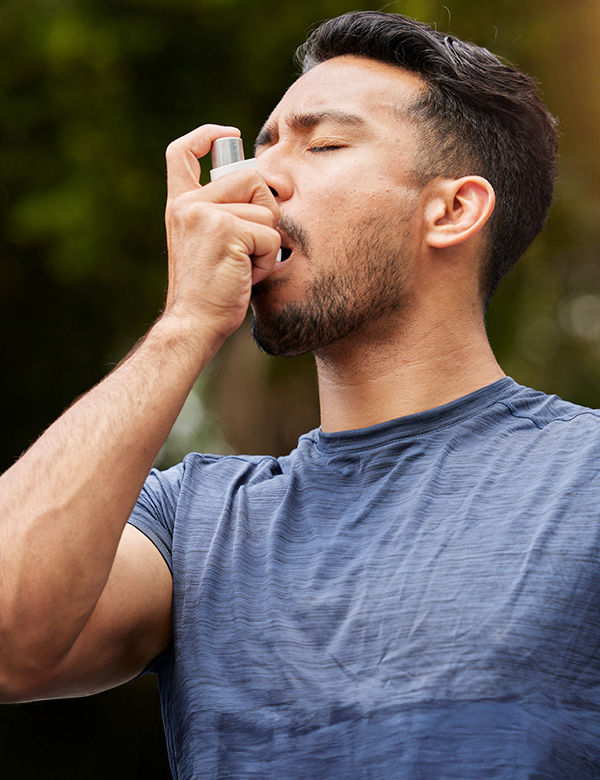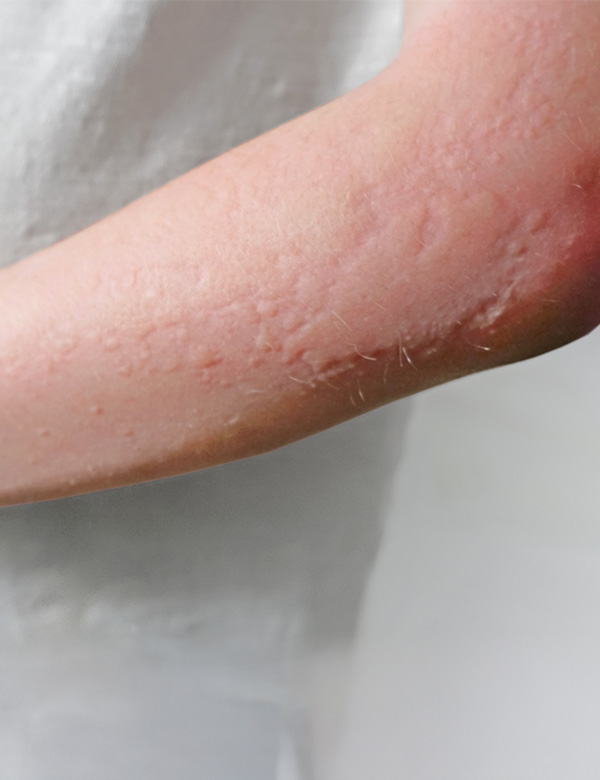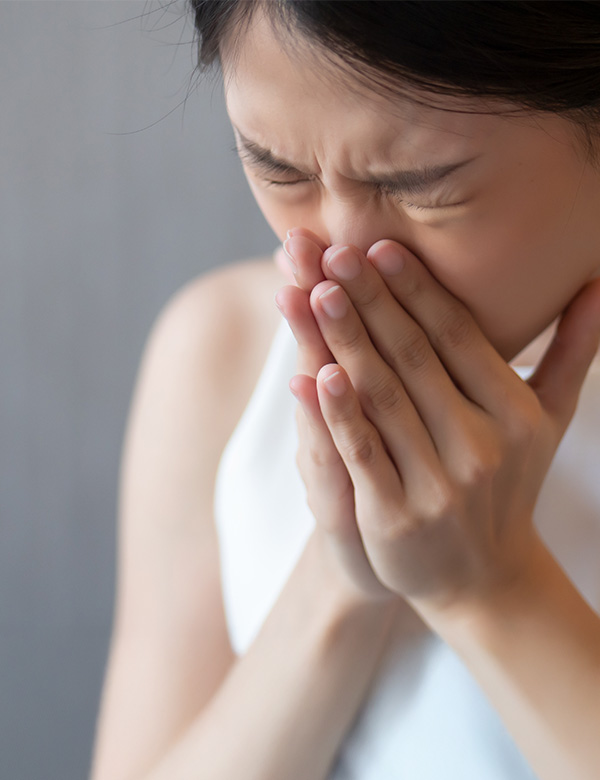Hyposensitization
Hyposensitization for grass and pollen allergy (hay fever), dust mite allergy, pet hair allergy, and insect stings – directly at Derma Medical Clinic in Zurich – Sihlcity
Hyposensitization
Chronische Abszesse und schmerzhafte Knoten durch erfahrenen Hautarzt abklären und behandeln in der Derma Medical Clinic in Zürich - Sihlcity
Injection therapy or tablet treatment for allergies: Hyposensitization – also called immunotherapy or desensitization – offers a long-term treatment option for allergies
Examinations
Allergy testing
Assessment of whether immunotherapy is necessary
Procedure
Initial consultation incl. allergy testing
Long-term treatment
Duration
Initial consultation incl. testing approx. 30 minutes
Treatment duration approx. 3 years
What Is Hyposensitization?
In people with allergies, the immune system mistakenly sees certain harmless substances as threats: it reacts with strong sneezing, shortness of breath, or itchy eyes.
In hyposensitization – also known as specific immunotherapy or desensitization – the immune system is trained step by step to recognize the trigger as harmless. Over an extended period – usually three years – the body is gradually given very small, precisely measured amounts of the allergy trigger, such as grass pollen, dust mites, pet hair, or insect venom.
Over time, the allergic reaction becomes much milder – or may even stop completely.
This long-term allergy treatment is especially helpful if you …
- suffer from severe pollen allergies or hay fever at the same time every year
- regularly get allergy symptoms when exposed to dust mites or pet hair
- have swelling, shortness of breath, or circulation problems after insect stings
- notice that anti-allergy medications no longer help enough or cause side effects
- might develop allergic asthma, or already feel early signs

What Is Hyposensitization?
In people with allergies, the immune system mistakenly sees certain harmless substances as threats: it reacts with strong sneezing, shortness of breath, or itchy eyes.
In hyposensitization – also known as specific immunotherapy or desensitization – the immune system is trained step by step to recognize the trigger as harmless. Over an extended period – usually three years – the body is gradually given very small, precisely measured amounts of the allergy trigger, such as grass pollen, dust mites, pet hair, or insect venom.
Over time, the allergic reaction becomes much milder – or may even stop completely.
Who Can Benefit from Hyposensitization?
This long-term allergy treatment is especially helpful if you …
- suffer from severe pollen allergies or hay fever at the same time every year
- regularly get allergy symptoms when exposed to dust mites or pet hair
- have swelling, shortness of breath, or circulation problems after insect stings
- notice that anti-allergy medications no longer help enough or cause side effects
- might develop allergic asthma, or already feel early signs
Treatment
First, we check whether this treatment is right for you. This includes:
- a detailed talk about your symptoms
- a skin allergy test (known as a prick test) – small amounts of allergens are placed on the skin on your forearm and gently pricked to see the reaction
- a blood test if needed
- additional tests (e.g. provocation test, lung function)
What Types of Immunotherapy Are Available?
Depending on the allergy and your daily routine, there are two options:
Allergy injections (“SCIT – subcutaneous immunotherapy”):
Regular injections into the upper arm – usually weekly at first, later every 4–6 weeks. Sometimes given only before pollen season. Treatment takes place at our clinic under medical supervision.
Allergy tablets (“SLIT – sublingual immunotherapy”):
Daily tablets or drops placed under the tongue, taken at home. The first dose is taken at our clinic under medical supervision, and then at home with regular check-ins.
In both cases, the treatment usually lasts about 3 years.
How Does Hyposensitization Work?
Allergy testing and consultation
We begin with an allergy test (e.g. prick test or blood test) to find out what exactly is causing your symptoms. Then we discuss whether hyposensitization is right for you and which method suits you better – tablets or injections.
Starting treatment with allergy injections
You will first receive weekly injections under the skin. Later, the intervals may increase to every 4–6 weeks. If taking tablets: your first dose is given in our clinic under medical supervision. After that, you’ll take them every day at home – for about 3 years.
Regular follow-up appointments
Whichever method you choose, we closely monitor your treatment: We check how well you’re tolerating the therapy, whether your symptoms improve, and adjust the dosage or timing if needed.

At Derma Medical Clinic, allergy treatments are carried out by Dr. Markus Dendorfer, dermatologist and allergy specialist.
He has many years of experience in diagnosing and treating allergic conditions, from hay fever to complex allergic reactions.

Dr. med. Markus Dendorfer
Board-certified Specialist in Dermatology and Venereology FMH
What You Can Expect from Us
Continuous care from the same specialist
Immunotherapy lasts several years. With us, you’ll be personally supported by the same doctor throughout your treatment.
Support for complex allergies too
If you’re allergic to multiple substances or also have asthma or skin issues, we’ll tailor your treatment to avoid interactions with other therapies.
A treatment plan that fits your life
Whether you choose regular injections at our clinic or tablets for home use, we’ll create a plan that fits into your everyday life.
Everything under one roof
You’ll get diagnosis, medical treatment, and aesthetic support in one place. This means known contacts, short distances, and coordinated care – from your first visit through to aftercare.
Do your allergies flare up every year, despite medication?
Book your personal consultation at Derma Medical Clinic in Zurich – Sihlcity to discuss your diagnosis and personalized treatment plan.
FAQ – Frequently Asked Questions About Hyposensitization
What is hyposensitization?
Hyposensitization – also called specific immunotherapy – is a medical treatment that gradually gets your immune system used to the substance causing your allergy. The goal is to reduce or even eliminate your symptoms. It’s currently the only treatment that addresses the cause of certain allergies.
What’s the difference between desensitization and hyposensitization?
In medical terms, desensitization and hyposensitization mean the same: a specific immunotherapy in which your body is slowly exposed to an allergen. The aim is long-term reduction or prevention of allergic reactions. “Hyposensitization” is used more in medical contexts; “desensitization” is more common in everyday speech.
Who is hyposensitization suitable for?
Hyposensitization is recommended for patients with a confirmed allergy – such as to pollen (grasses, trees), dust mites, pet hair, or insect venom – and whose symptoms are bothersome or can’t be well controlled with medication alone.
What is the treatment process?
There are two forms of therapy:
- Allergy injections (subcutaneous immunotherapy): regular injections under the skin
- Allergy tablets (sublingual immunotherapy): daily tablets or drops under the tongue
The treatment usually lasts 3 years and can be seasonal (e.g. before pollen season) or year-round.
Which allergies can be treated?
Hyposensitization can help with:
- Pollen allergies (e.g. grass, birch)
- Dust mite allergies
- Pet hair allergies (e.g. cat)
- Insect venom allergies (e.g. bee, wasp)
When should treatment start?
It’s best to start a few months before the relevant pollen season – for example, in fall or winter for grass or tree pollen. For year-round allergies like dust mites, you can start at any time.
How long does hyposensitization take?
Treatment normally lasts about 3 years. Studies show that effects often last for years after therapy ends – especially if the treatment was followed consistently.
How effective is the therapy?
Many patients feel better even in the first year. Long-term, the symptoms can improve significantly – and for some people, they go away completely. Best results are seen in younger patients and those treated early.
Are there any side effects?
Mild reactions at the injection site (e.g. redness, swelling) or brief symptoms like mouth itching (with SLIT) are possible. Serious side effects are rare. The treatment is done under medical supervision.
Is hyposensitization suitable for children?
Yes, this therapy is also suitable for children – usually from preschool age. Starting early can improve long-term results.




